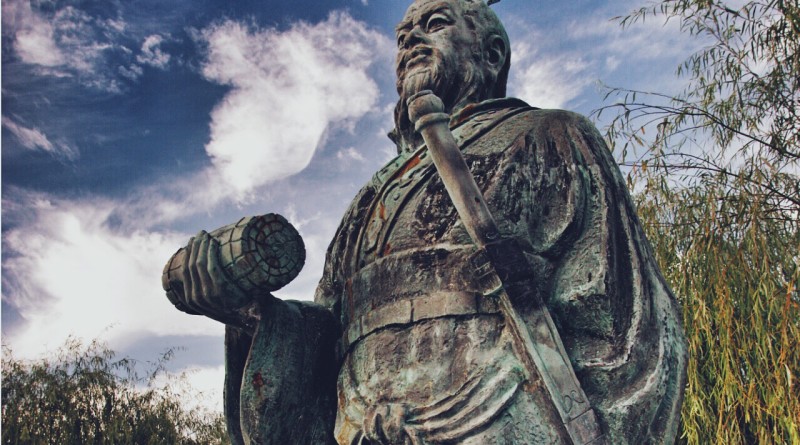Sun Tzu was a Chinese general, military strategist, writer and philosopher who lived in the Eastern Zhou period of ancient China. Sun Tzu is traditionally credited as the author of The Art of War, a widely influential work of military strategy that has affected both Western and East Asian philosophy and military thinking. Take a look below for 28 more fascinating and interesting facts about Sun Tzu.
1. Aside from his legacy as the author of The Art of War, Sun Tzu is revered in Chinese and East Asian culture as a legendary historical and military figure.
2. His birth name was Sun Wu, and he was known outside of his family by his courtesy name Changqping.
3. The name Sun Tzu, by which he is best known in the Western World, is an honorific name which means “Master Sun.”
4. The Han dynasty historian Sima Qian and other traditional Chinese historians placed him as a minister to King Helu of Wu and dated his lifetime to 544 BC to 496 BC.
5. Sun Tzu’s work has been praised and employed throughout East Asian warfare since its composition.
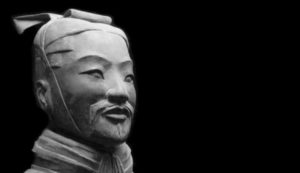
6. He was born into an aristocratic military family.
7. As a young man, he became an adviser to the warlord of the state of Wu and helped him defeat his more powerful rivals from the state of Chu.
8. Skilled and experienced in warfare matters during a time of unprecedented political and military turmoil, Sun Tzu validated his words with results.
9. When asked by King Ho-lu whether The Art of War can be applied to anyone, Sun Tzu replied, “Yes.”
10. With Sun Tzu as his general, King Ho-lu captured the capital city of Ying to defeat the powerful Ch’u state in 506 BC.
11. Beginning around the 12th century, some scholars began to doubt the historical existence of Sun Tzu, primarily on the grounds that he’s not mentioned in the historical classic Zuo zhuan, which mentions most of the notable figures from the Spring and Autumn period.
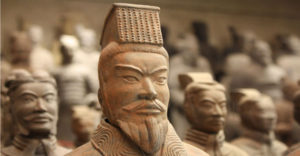
12. Sun Tzu’s Art of War has influenced many notable figures.
13. The Chinese historian Sima Qian recounted that China’s first historical emperor, Qin’s Shi Hangdi, considered The Art of War invaluable in ending the time of the Warring States.
14. In the 20th century, the Chinese Communist leader Mao Zedong partially credited his 1949 victory over Chiang Kai-shek and the Kuomintang to The Art of War.
15. The Art of War strongly influenced Mao’s writings about guerrilla warfare, which further influenced communist insurgencies around the world.
16. The Art of War was introduced into Japan in 760 AD and the book quickly became popular among Japanese generals.
17. The Admiral of the Fleet Togo Heihachiro, who led Japan’s forced to victory in the Russo-Japanese War, was an avid reader of Sun Tzu.
18. Ho Chi Minh translated The Art of War for his Vietnamese officers to study.
19. Ho Chi Minh’s general Vo Nguyen Giap, the strategist behind victories over French and American forces in Vietnam, was likewise an avid student and practitioner of Sun Tzu’s ideas.
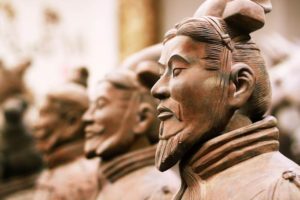
20. America’s Asian conflicts against Japan, North Korea and North Vietnam brought Sun Tzu to the attention of American military leaders.
21. The Department of the Army in the United States, through its Command and General Staff College, has directed all units to maintain libraries within their respective headquarters for continuing education of personnel in The Art of War.
22. Sun Tzu’s The Art of War is mentioned as an example of works to be maintained at each facility, and staff duty officers are obliged to prepare short papers for presentation to other officers on their readings.
23. The Art of War is listed on the Marine Corps Professional Reading Program.
24. During the Gulf War in the 1990s, both Generals Norman Schwarzkopf Jr. and Colin Powell employed principles from Sun Tzu related to deception, speed, and striking one’s enemy’s weak points.
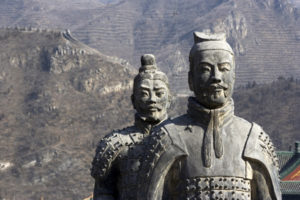
25. Daoism is the central principle in the Art of War.
26. Modern Chinese scholars explicitly rely on historical strategic lessons and The Art of War in developing their theories, seeing a direct relationship between their modern struggles and those of China in Sun Tzu’s time.
27. There is a great perceived value in Sun Tzu’s teachings and other traditional Chinese writers, which are used regularly in developing the strategies of the Chinese state and its leaders.
28. In 2008, the Chinese television producer Zhang Jizhong adapted Sun Tzu’s life story into a 40 episode historical drama television series entitled Bing Sheng, starring Zhu Yawen as Sun Tzu.

